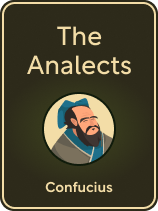

This article is an excerpt from the Shortform book guide to "The Analects" by Confucius. Shortform has the world's best summaries and analyses of books you should be reading.
Like this article? Sign up for a free trial here.
Do you feel guilty when you know you could have done more? Could you be more productive if you arranged your life differently?
In The Analects, Confucius teaches that good people work hard. So, if you want to be a decent person and live a meaningful life, you must put your mind to everything you do and give it your best.
Continue reading to learn about the importance of hard work in life, according to Confucius.
The Importance of Hard Work in Life
Confucius discusses the importance of hard work in life in the context of morality; working hard is simply part of being a good person. He adds that putting forth your best effort has personal benefits, so there are reasons for even a selfish person to do so. Hard work will bring you satisfaction—namely, if you always do your best, then you’ll be satisfied with your efforts regardless of their outcomes. For example, if you do your best at work and still get laid off, at least you’ll know that it wasn’t your fault.
On the other hand, if you don’t give your best effort, you’ll feel unsettled and guilty because you’ll know that you could have done more. For instance, if you slack off at work and then get laid off, you’ll feel guilty and anxious, wondering if you might have kept your job if you’d just worked harder at it.
(Shortform note: Contrary to what Confucius says here, you may find that trying your best and still not getting the outcome you want is more upsetting than failing due to a lack of effort. While you may not feel guilty and anxious, you might feel like there’s nothing more you can do. When this happens, remember that every failure can be both a lesson and motivation to spur you beyond your previous best. As long as you don’t give up, each failure will bring you closer to success.)
Confucius also advises you to adjust your life so that you can do your best. This could mean changing where you live, where you work, who you spend time with, or anything else—if something gets in the way of you living well and doing your best work, it’s not worth holding on to.
(Shortform note: It can be hard to know whether a particular situation is helping you do your best, especially if it’s a job or a relationship that you’ve been in for a long time. In that case, you may find yourself staying with something out of habit rather than because it’s actually helping you. In the case of a job, it may be time to move on if you’re feeling unmotivated, bored, or like your goals aren’t important to the people around you. In the case of a relationship, it might be time to move on if you find yourself perpetually annoyed with your partner, if they disrespect you (or vice versa), or if there’s distance between you.)
| Help Yourself by Working Hard for Others Philosophers from many different schools of thought believe that making the world a better place isn’t just a moral duty but also the best way to live a satisfying life. In other words, even from a selfish perspective, working hard and doing your best for others is worth the effort—by helping other people, you’ll also make yourself happy. For example, Marcus Aurelius’s Meditations—one of the definitive texts on Stoicism—says that working for the common good is the only way to live a happy and fulfilling life. Aurelius’s reasoning is that, to feel fulfilled, you must have a consistent goal and spend your life working toward that goal. However, people are naturally inconsistent; your personal desires and goals will change frequently. Therefore, any fulfilling goal must be selfless rather than oriented around your ever-changing personal preferences. |

———End of Preview———
Like what you just read? Read the rest of the world's best book summary and analysis of Confucius's "The Analects" at Shortform.
Here's what you'll find in our full The Analects summary:
- A collection of Confucius's teachings compiled by his students
- Lessons about how to be a good learner, person, and leader
- Concrete methods for putting Confucius’s teachings into practice






